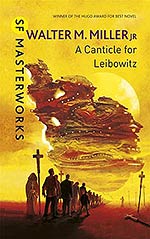
![]() DrEvilO
DrEvilO
10/9/2016
![]()
Odd as it sounds, this is hot toddy, warm blanket comfort food for me. Admittedly, that's not the typical description of this cynical, bleak-themed, post-apocalyptic SF classic. However, the easy, breezy style with which Miller explores his melancholy material manages to pluck smiles from me whenever I pick it up. This go around, I listened to the audio version which was recently released it was as mood brightening an experience as my previous read through.
Despite dealing with dark, somber subject matter and ultimately ending on a tragic crescendo of "humanity is stupid, savage and screwed," the journey of the novel is so filled with engaging characters and genuine humor that the surrounding depression and moroseness of the narrative theme just can't seem to grab hold of you. At least, it never laid an accusing finger on me.
Canticle is broken up into 3 Sections, each taking place approximately 6 centuries apart. Beginning in the 26th century, 600 years after the Flame Deluge when nuclear buffoonery laid waste to civilization, the central focus of the story is a Roman Catholic monastery founded by a Jewish weapons engineer for the purpose of safeguarding and preserving human knowledge.
Shortly after the geniuses of the 20th Century decided to light up the globe like Hell's own 4th of July, the surviving residents of Planet "radiation burn" decided that brains and books were overrated and followed up the Flame Deluge with the Simplification, whereby they roasted all of the books (along with any person smart enough to read or write one).
Isaac Leibowitz, after being part of the military machinery that microwaved the planet, made it his mission in life to try and preserve knowledge for the future. Thus the Albertian Order of Leibowitz was founded.
The first third of the book introduces us to the post apocalyptic world and gives a back-story on the Flame Deluge and the mission of the Order of Leibowitz. Located in what was the Southwestern United States, the Order tracks down and smuggles 20th century "memorabilia" into the abbey (a process known as "booklegging") while trying to avoid being killed (and possibly eaten) by the self-described "Simpletons" roaming the wastelands.
The next section of the book takes place in the 32nd Century and shows humanity finally emerging out of the dark ages of the Simplification and beginning to once again embrace the knowledge. This section focuses primarily on the growing feud between the resurgent secular scientists and the Church over the control and distribution of technology. Similar to our own renaissance period, the story describes science and natural law going toe-to-toe with the info hoarding monks as powerful city-states run by warlords play both sides for advantage.
Finally, in the 38th Century, the last section of the book shows humanity once again in the full flower of its technological brilliance and historical stupidity ready to give the Earth another nuclear facial (Note:I was going to use "atomic facial," but the Urban Dictionary makes that term very inappropriate here). War is coming and the forces of history are once again driving humanity like cattle towards the abattoir.
Thus we see the overarching theme of Miller's masterpiece; the cyclical nature of history. Miller's moral: as a species we are too stupid not to truly learn from our past blunders and are doomed to continue to screw the pooch and the planet with our giant, atomic phalluses. I know, not exactly a cheery, pump it up pep talk. However, the tone and the narrative style are anything but dreary.
Miller does a wonderful job creating a world that is large and mysterious and yet instantly recognizable and relatable. His characters are flawed, genuine and mostly decent and live through their times with a sense of purpose and optimism that belies the smothering embrace of history as it squeezes events into an all too familiar pattern.
Miller's ability to write brightly of such bleakness is truly extraordinary. The story is dark, fatalistic and filled with pessimism yet the prose is light, hopeful and filled with optimism. The word bitter never comes to mind.
In addition to the overriding theme of history's wheel-like pattern, Miller touches on other serious issues such as euthanasia and the right to life, the place of art in society and the nature of war itself. This is a towering science fiction work, but Miller's messages are deftly delivered behind a humorous, engaging future history.
In sum, this book is a light touch of morale outrage. It's a cozy warning of man's stupidity. It's a warm, comforting "blankie" for our inner cynic to snuggle with while we wait for the shoe/anvil to drop.